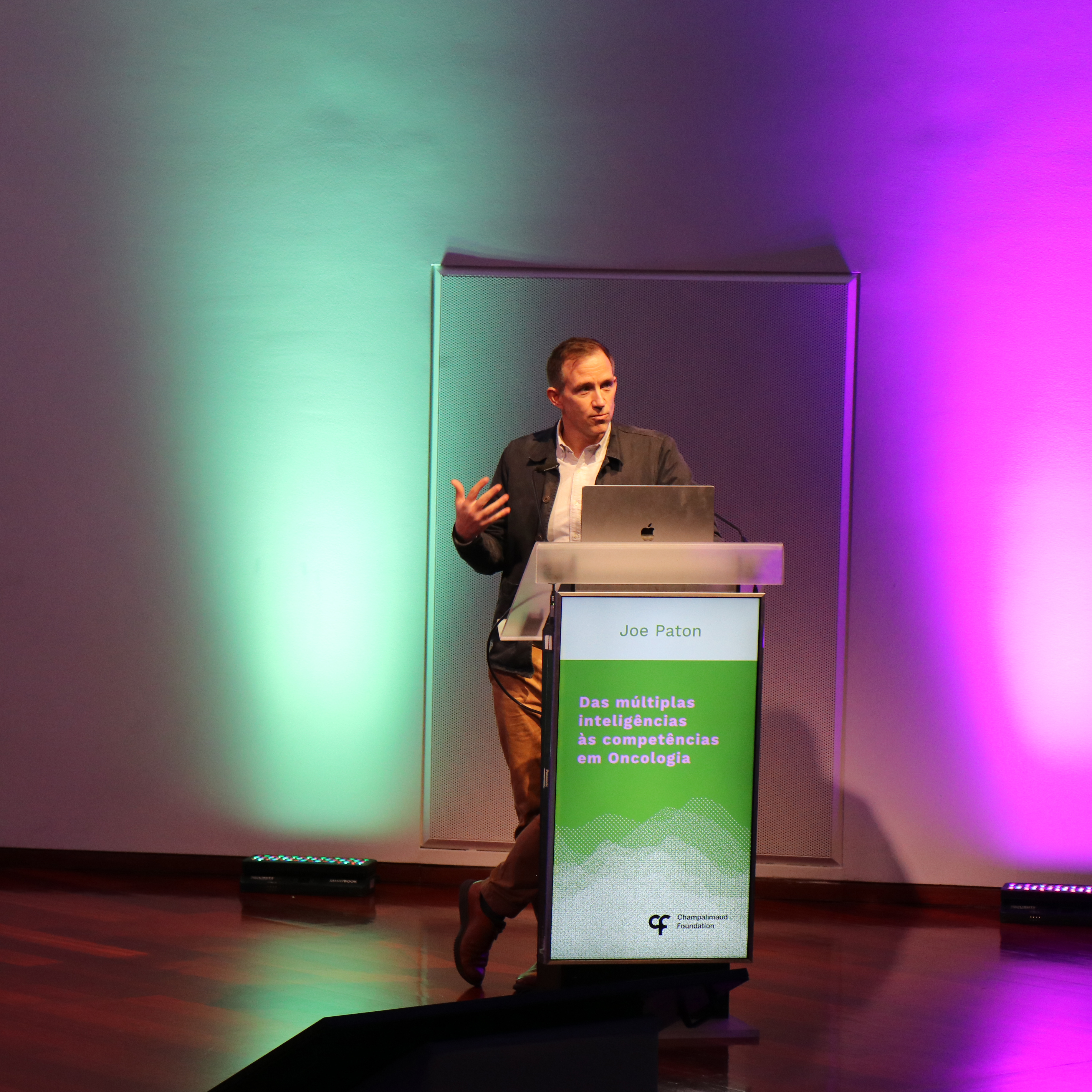The Champalimaud Foundation has an experimental robot called Wingy, which runs Chat GPT and is expected one day to be able to greet patients who come to its Clinical Centre. But will Wingy replace the people currently in charge of that job?, asked Pedro Garcia da Silva, neuroscientist and Scientific Coordinator at Champalimaud Research, during his talk at the Champalimaud Cancer Nurse Conference, which took place at the Foundation on May 19th.
Going further: to the question of whether nurses will one day be replaced by artificial intelligences (AI), Garcia da Silva, who considers himself to be a “technological optimist”, unhesitatingly answered: “I doubt nurses will be replaced”. But he did not forget the risks involved in AI, the most important for him being, in the health arena, the inequalities that will be generated in health care if the use of AI is not democratised. “We can’t cater only to the rich”, stressed Garcia da Silva.
The truth is that more and more nurses will be needed who know how to interact with AI in their daily work, pointed out Joe Paton, neuroscientist and co-director of Champalimaud Research during his own talk. Paton also explained that AI is very far from being comparable to human intelligence. “AI is a tool to be used by natural minds”, he said. And then he went on to present the huge differences between these two types of intelligence, starting with the fact that, although neurons are binary entities (they either fire or not nervous impulses), just as microelectronic transistors, the brain does not at all function like a computer.
To simulate a single neuron, he further explained, we need four million transistors. And although a computer CPU [central processing unit] can currently accommodate billions of transistors, the human brain possesses close to 85 billion neurons – plus a humongous number of synapses, or connections, between them.
Paton also pointed out that, while natural intelligence is “evolved, embodied, distributed, hierarchical and action and movement oriented” (that is, proactive, intentional), AI is reactive: without an external action, it just sits there doing nothing. “At the engineering level, we are far from the human brain in terms of biological, molecular and cellular complexity”, he added.
“My second argument is more philosophical”, he continued, this time giving as an example the comparison between the visual system and a photographic camera. “The brain is not a reproduction machine, it is always trying to decide how to act. The retina is nothing like a camera's sensors”, he stated. And although the performance of machine vision algorithms can be extremely good given sufficient training, making them very useful”, he stressed, “they are not very intelligent”.
For all these reasons – and also due to the risks posed by AI at the ethical and legal levels, as well as by the lack of regulation, etc., it will always be necessary to “keep people in the loop”, Paton concluded. “Collaboration between doctors, nurses and AI technologies can decrease the number of human errors, and the time needed to accomplish tasks”, namely bureaucratic ones. Patton believes that, in the future, AI will enter the clinic through such a collaboration, which will be interactive and where AI may even come to offer patients assistance, companionship and digital therapeutics.
Also of note was the talk given by Maria João Cardoso, surgeon at the Foundation’s Breast Unit, who presented the Cinderella project, which she is leading, and that also uses AI. The project aims to optimise, in a personalised way, the prediction of the results of reconstructive breast surgery in women with breast cancer, in order to improve patient satisfaction with those results in terms of body image (https://fchampalimaud.org/news/cinderella-project-right-see-yourself-mi…). Cardoso pointed out, in particular, the importance of nurses’ role in this project, given that they are at the front line in terms of contact and communication with patients.
The question of emotional intelligence was also addressed during the conference. In particular, Maggie João, a specialist in stress management coaching, emphasised the importance of nurses’ emotional intelligence in dealing with their own stress and that of their patients, and gave some insights about how to put it to use. Also of note, the talk by Cátia Lampreia, a nurse at the Champalimaud Foundation, who presented a literature review, published at the beginning of 2023 in the Spanish peer-reviewed journal Enfermagem Clínica. The study, of which Lampreia is a first author, concluded that “emotional intelligence is an essential skill for critical care nurses, with repercussions at the professional, personal and organizational levels”. She also stressed that, in general, people who listen to their emotions tend to be more efficient in their profession.
Emília Rito, who is in charge of all the nurses integrated in the Multidisciplinary Pathology Units of the Champalimaud Clinical Centre (CCC), highlighted EONS’s (European Oncology Nursing Society) study programme, and Nuno Pereira (representative of the Portuguese Nursing Society) showed the long way nursing has come in Portugal. New therapies for treating depression, such as Transcranial Magnetic Stimulation (TMS), were the focus of the talks given by Patrícia Pereira, a nurse specialised in mental health, and Albino Oliveira-Maia, director of the Neuropsychiatry Unit at the CCC and leader of the Neuropsychiatry Group at CR. Fernanda Relveiro, the nurse in charge of the Day Hospital at the CCC, asked whether a solution had been found for the treatment of peripheral neuropathy, an incapacitating symptom with negative impact on patient quality of life. Clinical nurse specialist Pedro Queiroz spoke about the inherent challenges in pancreatic surgery, acknowledging that training and mutual help between members of the pathology multidisciplinary team are essencial for preventing complications and affording the best possible healthcare.
Francisco George, former Director-General of Health in Portugal, closed the day by talking about the various war fronts of the past centuries and the crucial role health professionals play in this context.
By Ana Gerschenfeld, Health & Science Writer of the Champalimaud Foundation.

